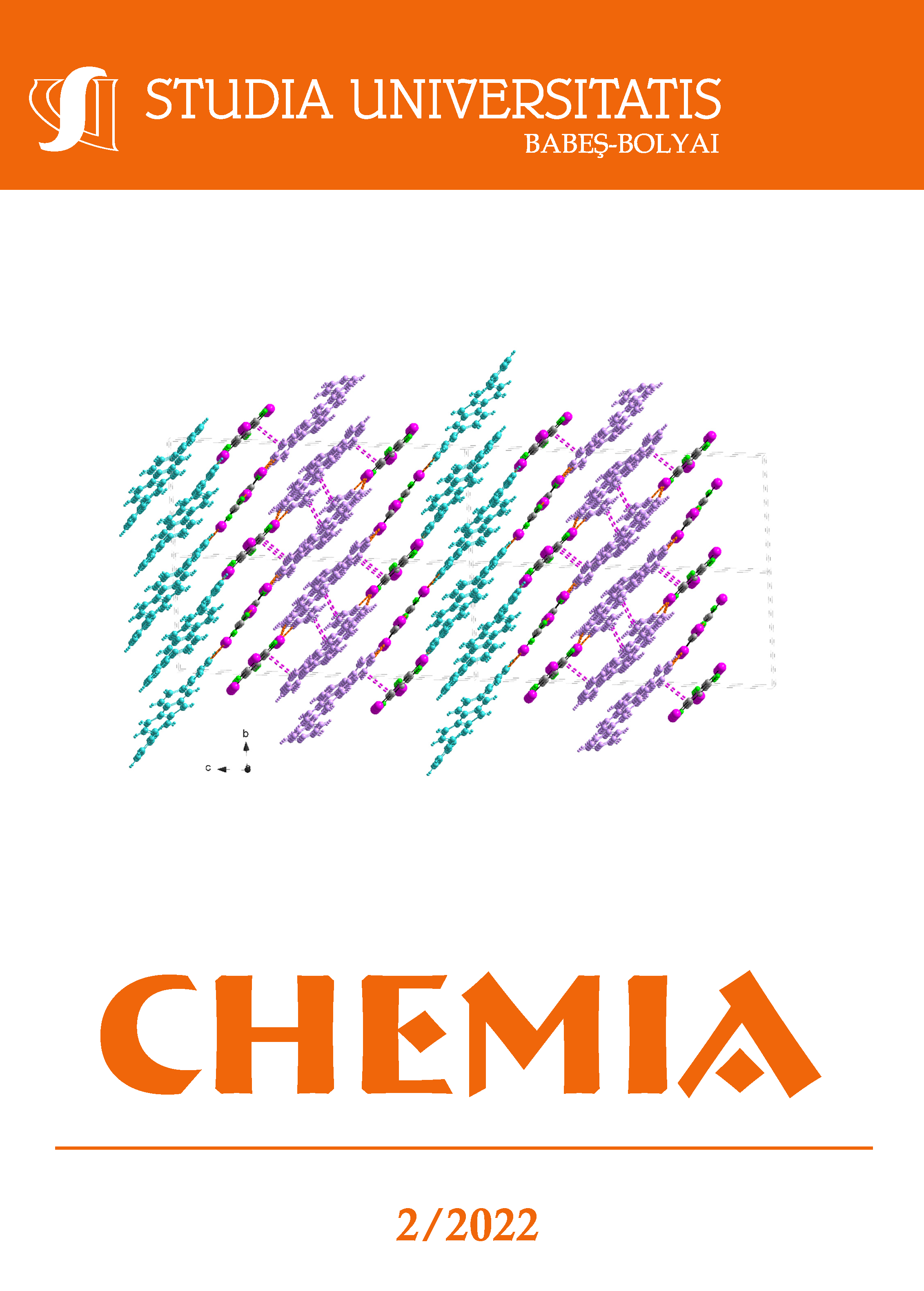BIOACTIVE COMPOUNDS AND ANTIOXIDANT CHARACTERISTICS OF VARIOUS TOMATO CULTIVARS FROM SERBIA – CHEMOMETRIC APPROACH
DOI:
https://doi.org/10.24193/subbchem.2022.2.07Keywords:
Tomato, Antioxidant characteristics, Bioactive compounds, PCA, Cluster analysis.Abstract
Tomato is one of the most consumed foodstuffs around the world and major dietary source of lycopene. The main objectives of this study were evaluation of antioxidant activity, using DPPH, ABTS, FRAP, TRP and CUPRAC assays, as well as total phenolic, total flavonoid, lycopene and β-carotene content in 30 tomato and cherry tomato cultivars commonly consumed in Serbia. Tomato with the highest total phenol and total flavonoid content was tomato Indigo Rose (17.56 mg GAE g-1 DW and 30.30 mg RE g-1 DW, respectively), which showed excellent antioxidant characteristics. Total lycopene content was lower in yellow tomato species compared to the red ones, and the highest lycopene content was 0.283 mg g-1 DW for tomato Red Pearl Big. Cluster analysis yields dendrogram, separating tomato and cherry tomato cultivars into three statistically significant clusters ((Dlink / Dmax)×100 < 50).
References
Solanine poisoning Brit. Med. J., 1979, 2, 1458–14599.
FAO, 2017, FAOStat http://www.fao.org/faostat/en/?#data Acessed March 20, 2020
L. Frusciante; P. Carli; M.R. Ercolano, R. Pernice; A. Di Matteo; V. Fogliano; N. Pellegrini; Mol. Nutr. Food Res., 2007, 51(5), 609–617.
E. Giovannucci; J. Natl. Cancer, 1999, 91(4), 317 – 331.
D. K. Pandey; R. Shekelle; B. J. Selwyn; C. Tangney; J. Stamler; Am. J. Epidemiol., 1995, 142(12), 1269 – 1278.
E. N. Story; R. E. Kopec; S. J. Schwartz; G. K. Harris; Annu. Rev. Food Sci. Technol., 2010, 1,189–210.
M. L. Nguyen; S. J. Schwartz; Food Tech., 1999, 53(2), 38 – 45.
A. V. Rao; S. Agarwal; J. Am. Coll. Nutr., 2000, 19(5), 563– 569.
A. V. Rao; S. Agarwal; Nutr. Cancer, 1998, 31, 199–203.
E. Capanoglu; J. Beekwilder; D. Boyacioglu; R. C. H. De Vos; R. D. Hall; Crit. Rev. Food Sci. Nutr., 2010, 50(10), 919-930.
R. C. Ray; A. F. El Sheikha; S. H. Panda; D. Montet; Int. J. Ferm. Tech., 2011, 1(2), 139-148.
R. K. Toor; G. P. Savage; Food Res. Inter., 2005, 38, 487–494.
A. N. Panche; A. D. Diwan; S. R. Chandra; J. Nutr. Sci., 2016, 5, 1-15.
Y. Qi, Characterization of phytochemicals and antioxidant activities of specialty tomatoes. Master Thesis, The University of Guelph, Canada. 2016
M. P. Kahkonen; A. I. Hopia; H. J. Vuorela; J. P. Rauha; K. Pihlaja; T.S. Kujala; M. Heinonen; J. Agric. Food Chem., 1999, 47(10), 3954 –3962.
F. Serio; O. Ayala; A. Bonasia; P. Santamaria; Antioxidant Properties and Health Benefits of Tomato In Progress in Medicinal Plants—Search for Natural Drugs, J. N. Govil, V. K. Singh, C. Arunchalam Eds.; Studium Press LLC, Houston, TX, USA, 2006, 159-179.
L. Barros; M. Dueñas; J. Pinela; A. M. Carvalho; C. S. Buelga; I. C. F. R. Ferreira; Plant Food Hum. Nutr., 2012, 67(3), 229–234.
E. Ooe; K. Ogawa; T. Horiuchi; H. Tada; H. Murase; K. Tsuruma; M. Shimazawa; H. Hara; Biosci. Biotech. Biochem., 2015, 80(2), 341–349.
M. Baranska; W. Schütze, H. Schulz; Anal. Chem., 2006, 78 (24), 8456–8461.
J. Burns; P. D. Fraser; P. M. Bramley; Phytochem., 2003, 62(6), 939–947.
W. Klunklin; G. Savage, Foods, 2017, 6(8), 56.
N. S. Kerkhofs; C. E. Lister; G. P. Savage; Plant Food Hum. Nutr., 2005, 60(3), 117–121.
A. Zanfini; G. G. Franchi; P. Massarelli; G. Corbini; E. Dreassi; Ital. J. Food Sci., 2017, 29, 90-99.
R. Apak; S. Gorinstein; V. K. Böhm; M. K. Schaich; Pure Appl. Chem., 2013, 85(5), 957-998.
R. Berni R; M. Romi; L. Parrotta; G. Cai; C. Cantini; Hortic., 2018, 4, 51.
A. Pirillo; A. L. Catapano; G. Ital. Farmacoeconomia Farmacoutilizzazione, 2014, 6(4), 23–30.
V. Sidhu; D. Nandwani; L. Wang; Y. Wu; J. Food Qual., 2017, 2017, 5020742.
V. Mitic; M. Ilic; M. Dimitrijevic; J. Cvetkovic; S. Ciric; V. Stankov Jovanovic; Fruits, 2015, 71(1), 57–66.
H. F. Kaiser; Educ. Psychol. Meas., 1960, 20, 141 – 151.
M. Dimitrijevic; V. Stankov Jovanovic; J. Cvetkovic; T. Mihajilov-Krstev; G. Stojanovic; V. Mitic; Anal. Methods, 2015, 7(10), 4181–4191.
S. S. Mitic; B. T. Stojanovic; M. B. Stojkovic; M. N. Mitic; J. L. Pavlovic; Bulg. Chem. Commun., 2013, 45, 326-331.
L. Barros; M. J. Ferreira; B. Queiros; I. C. Ferreira; P. Baptista; Food Chem., 2007, 103(2), 413-419.
M. Oyaizu; Jpn. J. Nutr., 1986, 44, 307–315.
I. F. F. Benzie; J. J. Strain; Anal. Biochem., 1996, 239(1), 70–76.
R. Apak; K. Güçlü; M. Özyürek; B. B. Oğlu; M. Bener; Methods Mol. Biol., 2008, 477, 163–93.
I. Gergen; M. Harmanescu; Chem. Cent. J., 2012, 6, 156.
Downloads
Published
How to Cite
Issue
Section
License
Copyright (c) 2022 Studia Universitatis Babeș-Bolyai Chemia

This work is licensed under a Creative Commons Attribution-NonCommercial-NoDerivatives 4.0 International License.



